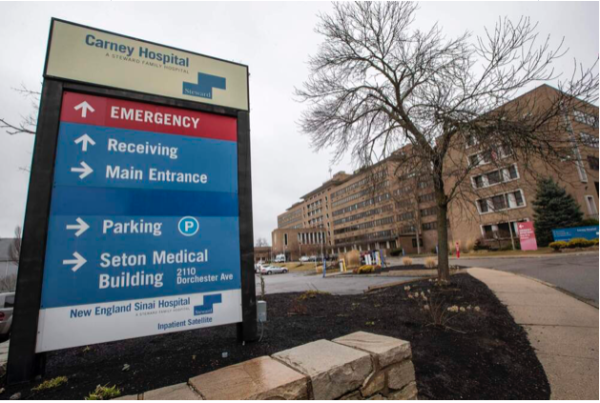January 22, 2024

Carney Hospital in Dorchester is one of several Massachusetts facilities operated by Steward Health Care System. Jesse Costa/WBUR photo
The operator of 9 Massachusetts hospitals says financial challenges are jeopardizing its ability to keep them running, which could leave patients struggling to access care and result in thousands of layoffs for health care workers.
Steward Health Care System, a for-profit company that serves thousands of patients in Massachusetts, is in talks with the state to try and stay afloat.
Steward, based in Dallas, said the past few years and the pandemic have devastated community hospitals including those it operates in Massachusetts. The main issue, the company said, is the gap between reimbursement rates that insurers and government health programs pay to community hospitals, compared to what they pay large academic medical centers.
RELATED: Carney Hospital struggles amid pay gap, labor talks; ‘No imminent plans to close’
EDITORIAL: Carney’s parent company is neglecting a neighborhood asset
"This gap has only continued to increase and most community hospitals — including Steward hospitals in Massachusetts — are suffering losses that jeopardize their ability to continue to offer services," Steward said in an emailed statement.
Most Steward facilities are in eastern Massachusetts and include St. Anne's Hospital in Fall River, Good Samaritan Medical Center in Brockton, St. Elizabeth's Medical Center in Brighton, Carney Hospital in Dorchester, Holy Family Hospital in Methuen, Holy Family Hospital in Haverhill, Morton Hospital in Taunton and Nashoba Valley Medical Center in Ayer. The company said 70% of its patients are covered by Medicaid or Medicare, and it employs about 14,000 people.
Last month, Steward notified the state that it would soon close New England Sinai Acute Long-Term Care And Rehabilitation Hospital in Stoughton. The company blamed financial challenges and low reimbursement rates for Medicare and Medicaid services.
Any potential hospital shuttering comes at a time when Massachusetts hospitals are already struggling to handle a high volume of patients. Many hospitals are operating at or above capacity amid a shortage of health care workers and a season of increased viral infections, including the flu, RSV and COVID-19. Across Massachusetts hospitals, emergency departments are crowded, and patients frequently wait hours for beds.
"If they close facilities, it would really cripple the Massachusetts health care ecosystem," said health care consultant Dr. John Freedman with Freedman HealthCare." They're a big provider, particularly in underserved areas, and it would be a big problem."
State officials are promising to closely monitor the situation and ensure patient care and health care jobs are protected. Gov. Maura Healey's office said it has been in regular talks with Steward about its financial situation.
"We are exploring all options to ensure that patients across Massachusetts continue to have access to the care they need, that jobs are preserved and that our health care system is stable," said Karissa Hand, a spokesperson for Healey.
The Massachusetts Executive Office of Health and Human Services said the state's priority is maintaining "safe and high-quality care" in all health care facilities.
"When healthcare facilities or services close, we are always concerned about any potential disruption to patients, healthcare workers, families, and communities," an EOHHS spokesperson said in a statement."[The state Department of Public Health] will continue to closely monitor and work with Steward to protect patients, preserve jobs, and maintain quality.”
House Speaker Ron Mariano said state lawmakers appropriated tens of millions of dollars to Steward as part of $780 million in federal pandemic relief, and he wants more information about the company's financial difficulties.
“While there remain many unanswered questions as to Steward’s fiscal condition and future plans in Massachusetts, the House will continue to work with the Administration to monitor the situation, keeping in mind the vital public health and economic role that hospitals play in our communities," Mariano said in a statement.
Information about Steward's finances has been elusive. The company has not filed financial disclosures that hospitals typically provide to the state. Steward claims the state doesn't have the authority to collect confidential business information, and the matter is currently the subject of litigation between Steward and the state. Data from the Center for Health Information Analysis shows that in the last fiscal year, roughly half of Steward's Massachusetts hospitals were operating in the red.
For years there have been signs of financial troubles at Steward, some of it outlined in filings by the real estate company Medical Properties Trust, which is one of the largest hospital property owners in the country. Steward sold and then leased back real estate from Medical Properties Trust. Earlier this month, the company said Steward was making only partial rent payments, and its unpaid rent totaled approximately $50 million.
On January 4, Steward executives sent a memo to staff that said 2023 was a "tough year," and they are seeking help from elected officials. The executives pointed to low reimbursement rates and care for immigrants who entered the country without authorization among the reasons for financial headwinds.
"We will, of course, begin every process around the care of Medicaid patients and undocumented immigrants by seeking governmental support to simply keep these programs close to break even," said the memo from Steward Health Care System President Mark Rich. "We look forward to working with elected officials to expeditiously find solutions to these issues."
This article was first published by WBUR 90.9FM on Jan. 19. The Reporter and WBUR share content through a media partnership.


